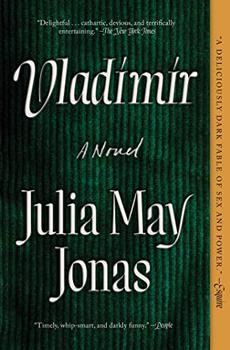Summary | Excerpt | Reading Guide | Reviews | Beyond the Book | Readalikes | Genres & Themes | Author Bio

A Novel
by Julia May JonasChapter I
Although I had seen and heard Vladimir speak during the master class, the candidates luncheon, and the faculty retreat, I had not had the chance to say more than a few words directly to him until the fall semester. When I first met him, in the spring after he'd been hired as a full-time junior professor, I was coming late to and leaving early from all full-faculty events to avoid having to talk with any of my colleagues. Even sitting three chairs away from Florence was almost too much for me to bear—lightning bolts of anger shot from my vagina to my extremities. I've always felt the origin of anger in my vagina and am surprised it is not mentioned more in literature.
On an early September evening, the first week of the semester, he visited me at my home, and that is when we had our first real conversation. I was enjoying the cool breeze in the sitting room of our town house, drinking mineral water—my rule is that if I am alone I do not drink alcohol until 9 p.m. (a practical tactic to keep my weight down)—and reading a history of witches in America, when he rang the bell. Since the allegations had been brought against my husband, I felt unable to read fiction. Usually I eagerly set about a reading project each summer to find at least one or two new short stories or novel excerpts to read with my classes. It was important for them and me to always keep acquainted with the contemporary voice. This summer, however, my eyes felt as though they could not focus on the words. The invented worlds, all the made-up-ness and stolen-ness of fiction, all the characters—they felt like a meager and pitiful offering. I needed dates, facts, numbers, and statistics. Weapons. This is our world and this is what happened in it. In the first class of my survey courses I was accustomed to reading a section of Poetics aloud. In it Aristotle discusses the difference between history and poetry and why poetry, being crafted and theoretical, is a superior representation of humanity. This year I skipped it. This year I skipped my whole introductory lecture—usually a litany of references and quotations that I prepped and practiced for well in advance—designed to cow and delight my students. This year, instead, I asked them to speak about themselves and their experiences. While I wish I could say that this decision came from a desire to get to know them, it did not. On my notes for the class I wrote: "Have them talk! (They're only interested in what they think, anyway.)"
I heard a car pull into the drive, and then listened for a while as someone paced around the property, wondering which door to approach. In our town, there's a general custom of entering through the back porch, which, if the house has not been completely remodeled, opens to the kitchen, from a time when in-house help was more prevalent, and domestic labor less of a performance displaying taste, choice, and skill.
Vladimir, however, being new, rang the entrance at the front of the house—which opened to a cold little corridor that we used only as a pass-through to the upstairs. When I opened the door he stood spotlit by the porch light, and immediately put his free hand in his pocket, as though he had been adjusting his hair. He seemed abashed. I remembered my thirties, as a young mother, meeting young fathers, talking about where their sons or daughters were going to elementary school, or whether they were going to try out karate, and how thrilled it made me to see them adjusting their hair or clothing subconsciously: a nervous nod to the powers of attraction I possessed at the time.
He held a bottle of red wine in his other hand and a book tucked into his armpit. When I opened the door he awkwardly switched the two—moving the wine underneath his opposite arm, so it lay against his side like a violin at rest. He wore a knit tie with an engraved tie bar over a checked shirt with rolled-up sleeves, well-cut pants, and good-quality leather boots with thick white soles. Clearly a transplant from the city—no heterosexual man who'd spent much time here would look like that. Even my husband, a vain man with a taste for expensive Irish knit sweaters, had forgotten the specificity and light irony of urban style. My husband wore what he wore because he believed in it—he had lost the sense of costuming and presentation that well-dressed city dwellers naturally possessed. That perambulating sense of always being on display.
Excerpted from Vladimir by Julia May Jonas. Copyright © 2022 by Julia May Jonas. Excerpted by permission of Avid Reader Press. All rights reserved. No part of this excerpt may be reproduced or reprinted without permission in writing from the publisher.
Your guide toexceptional books
BookBrowse seeks out and recommends the best in contemporary fiction and nonfiction—books that not only engage and entertain but also deepen our understanding of ourselves and the world around us.